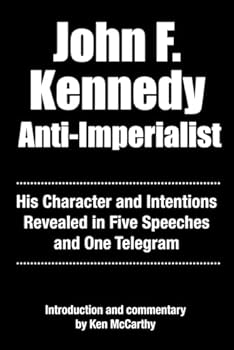John F. Kennedy Anti-Imperialist: His Character and Intentions Revealed in Five Speeches and One Telegram
The Oxford Dictionary has an elegantly simple definition of imperialism: "a system in which one country controls other countries, often after defeating them in a war." John F. Kennedy was an anti-imperialist in word and deed, and thus the purpose of this book: to make five speeches and one telegram available in book form that shine a light on this fundamental, but strangely overlooked, element of his nature and worldview Was Kennedy a member of the establishment? Yes, of course, he was, but he was a member of the establishment who used his position, first as a Senator from Massachusetts and then as the President of the United States, to publicly articulate over and over again an alternative vision of how the United States could use its power and wealth in the world peacefully and in a way that supported the independence and development of poorer, weaker nations. One may object that speeches are "just words" and that "talk is cheap", but speeches consume political capital and they come at a cost. Kennedy's speeches did indeed cost him and may have, along with his actions, materially contributed to his murder. He could easily have chosen less controversial subjects and opted instead for bland crowd-pleasers and empty "bread and circuses" promises that fit safely into the confines of consensus, but he did not. Instead, he chose to promote a picture of America that enraged very powerful forces. (From the introduction by Ken McCarthy)
Format:Paperback
Language:English
ISBN:B0D63MCG9M
ISBN13:9798327411296
Release Date:June 2024
Publisher:Independently published
Length:109 Pages
Weight:0.49 lbs.
Dimensions:9.0" x 0.3" x 6.0"
Customer Reviews
0 rating





